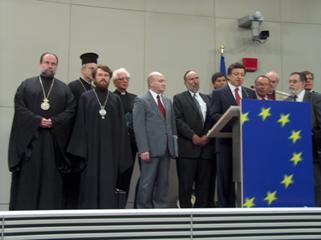President of the European Commission Meets with European Religious Leaders
 On
12 July 2005 the President of the European Commission Jose Manuel Barroso
met with 15 European religious leaders representing Christianity, Judaism
and Islam. The Orthodox Church was represented at the meeting by Metropolitan
Emmanuel (Adamakis) of France, Representative of the Patriarchate of Constantinople
to the European Union, Bishop Hilarion (Alfeyev) of Vienna and Austria,
Representative of the Russian Orthodox Church to the European Institutions,
Bishop Athanasios (Hatzopoulos) of Akhaia, Director of the Bureau of Representation
of the Church of Greece to the European Union.
On
12 July 2005 the President of the European Commission Jose Manuel Barroso
met with 15 European religious leaders representing Christianity, Judaism
and Islam. The Orthodox Church was represented at the meeting by Metropolitan
Emmanuel (Adamakis) of France, Representative of the Patriarchate of Constantinople
to the European Union, Bishop Hilarion (Alfeyev) of Vienna and Austria,
Representative of the Russian Orthodox Church to the European Institutions,
Bishop Athanasios (Hatzopoulos) of Akhaia, Director of the Bureau of Representation
of the Church of Greece to the European Union.
Opening the meeting, President Barroso made a presentation on the current state and future perspective of the European integration process, including the dialogue with the religions and churches on the EU level. He also expressed his deep condolences to the participants from the United Kingdom on the occasion of the London terrorist attacks.
Then followed the presentations by the religious leaders regarding the European integration process and the dialogue between the EU and religious communities.
In his presentation Bishop Hilarion pointed to article I-52 of the European Constitutional Treaty, which calls for an 'open, transparent and regular dialogue with churches and religious, as well as philosophical and non-confessional organizations.' In spite of French and Dutch 'no' to the Constitutional Treaty and uncertainty about its future destiny, stressed Bishop Hilarion, the provision about the dialogue with the churches and religious organizations must be retained and incorporated in any legislative document which may eventually replace the Constitutional Treaty.
The representative of the Russian Orthodox Church then spoke about the challenge of militant secularism faced by all major religions and about their willingness to conduct a dialogue with liberal humanism. This dialogue, noted Bishop Hilarion, 'is not about theology or religious beliefs. It is an anthropological dialogue, whose main subject is the destiny of humanity.'
Bishop Hilarion then pointed to many concrete examples of contradiction between modern secular and traditional religious positions on ethical issues: 'Religion, in particular, insists on the integrity of marriage, on the sinfulness of homosexual unions, on the inadmissibility of artificial disruption of human life, be it abortion, contraception, or euthanasia. Secularism, on the contrary, propagates "freedom of love", struggles for the rights of sexual minorities, and advances the idea that human life can be interrupted artificially. If such and similar norms are declared universal and are imposed on the entire population of the European Union fully and unconditionally, we risk to create a Europe which will never become a true home for those millions of people whose value system and behavioural standards are religiously motivated.'
Concluding his remarks, Bishop Hilarion stated: 'Religious leaders are already involved in a dialogue with the European Institutions, but I believe that this dialogue must be significantly broadened and better structured. From an unofficial dialogue whose participants are not mutually accountable, meeting from time to time without any further obligations, we must gradually move towards a more official platform for a dialogue in which the politicians and religious representatives will be placed on an equal footing. Only in this case will the dialogue of the EU with churches and religious organizations become truly open, transparent and regular.'
Responding to these remarks, President Barroso noted that no official structure for a dialogue with religious organisations was envisaged. However, he expressed his interest in continuing informal consultations with religious leaders on a regular basis.
The meeting concluded by the adoption of the common statement (see the full text below), which was read by President Barroso in the presence of journalists in the press room of the European Commission.
Statement of the Meeting between President
Barroso and Religious Leaders
Recent events concerning the ratification of the draft Constitutional Treaty have highlighted the challenges facing the Union.
If there is one common theme running through the various challenges, it is the need for Europe to be able to act in achieving concrete results that meet the concerns of the citizens.
A period of reflection and of debate is needed to enable citizens to appreciate the significance of the European project and therefore to reconnect Europe with its citizens.
The European Commission, as the guardian and the promoter of the common interest, has a particularly important role to play during this period. It should assist in creating greater trust in Europe, enhance the availability of information and encourage the emergence of a new consensus on what Europe is for. This can only be achieved through a process of open communication and dialogue.
Churches, religious communities and spiritual leaders of the three monotheistic religions bear great responsibility in this process.
On the occasion of the meeting between President Barroso and Christian, Jewish and Islamic religious leaders in Brussels on 12 July 2005, President Barroso and the religious leaders reaffirmed that they are dedicated to building a free, united, prosperous and peaceful Europe characterised by solidarity, where all citizens and nations, regardless of their religion, convictions, language, culture, tradition and ethnic origin, may live together and feel at home united in diversity.
The European Commission and the religious leaders are dedicated to continuing their dialogue to make this common vision of a united Europe a reality.
All participants strongly condemn the terrorist attacks against innocent people in London. No reason, in particular not a religious one, can justify such acts against humanity.